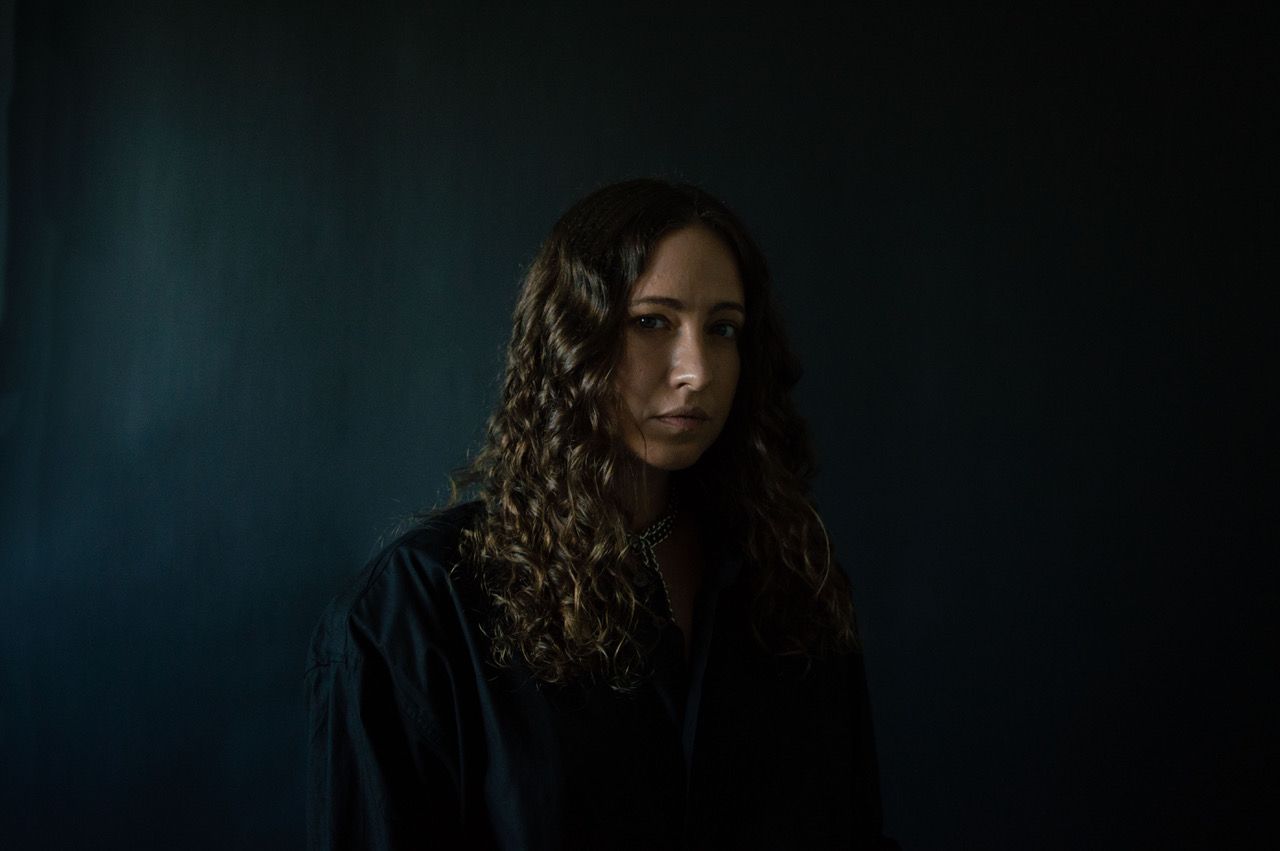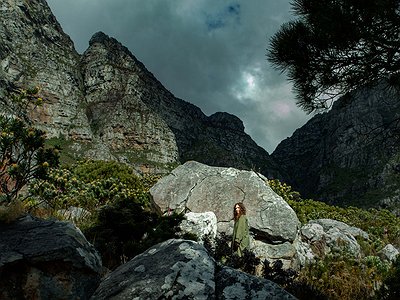Name: Anna Jordan aka The Allegorist
Nationality: Hungarian / German
Occupation: Sound artist, visual artist, producer, composer
Current release: The new album by The Allegorist, TEKHENU Retold, is out October 13th 2023 via Awaken Chronicles. It features remixes of pieces off her earlier TEKHENU full-length by, among others, Subheim, Ben Chatwin, Ah! Kosmos, Midori Hirano, and Scanner.
[Read our Subheim interview]
[Read our Ah! Kosmos interview]
[Read our Midori Hirano interview]
[Read our Scanner interview]
To keep reading, we recommend our earlier 15 Questions interview with The Allegorist and our conversation with her about Life & Death.
If you enjoyed this The Allegorist interview and would like to stay up to date with her music, visit her official homepage. She is also on Instagram, Facebook, twitter, and Soundcloud.
For you to get started, do there need to be concrete ideas – or what some have called a 'visualisation' of the finished work? What does the balance between planning and chance look like for you?
I’m almost always present as an artist next to my personal self. Sometimes living my life feels like I’m on duty all the time, heavy with a certain responsibility, like when you are taking care of someone.
At the same time I also just simply don’t want to miss out and be prepared when the spirit is visiting me. The spirit here is a metaphor for the beauty I can’t describe in words better. I want to be there in my best and purest form when it chooses to appear in front of me. Sparkling shy from under a rock in the woods or from the depths of the sky. And I want to be there, to pick up its little pieces scattered around and carry them home where also my heart lives.
For my heart would be lonely if I didn’t notice and simply walked by. I told my thoughts about this in my track “The Sacrifice.”
Many writers have claimed that as soon as they enter into the process, certain aspects of the narrative are out of their hands. Do you like to keep strict control or is there a sense of following things where they lead you?
I think not having all the control is everywhere in life, it is life.
As a society, we are trying really hard to get rid of variables. We’ve built a system where the higher up you are, the more you can push around numbers, creating the illusion of eliminating variables and creating predictability. When in reality variables don’t disappear, they just got delegated to others to handle them. You can work in both ways also as an artist. Within a safe area if you want and can afford it, or more venturesome.
I got into art to be a great student of life, and to create value, true art, something amazing. I wanted to be an archeologist when I was a child, to discover all the secrets of the world. And great new things never happen in safe and calculated areas, where attention is concentrated. Magic happens to those who are willing to go into the dark and find out themselves. And this is the path that interests me.
Perhaps my discoveries will never be in the spotlight, but I choose to study the mysteries, to go to see the other side.
Where does the impulse to create something come from for you? What role do often-quoted sources of inspiration like dreams, other forms of art, personal relationships, politics, etc play?
It feels a bit like a calling, which isn’t necessarily something that you can easily choose or abandon. Sometimes I wish I were free of this purpose that goes beyond myself, and to be interested in more ordinary things, that are directly beneficial to my own life. But it is not possible to live the life of someone else for a longer time.
I think about this urge often, what if it is a human disease? What good came from our urge to create amazing things, whether in art, science, or something else? Is this world we created through all our advancements so much better than it was before? Maybe our achievements are a pharmakon, meaning they are remedy, poison, and scapegoat at the same time.
But then, who am I to answer these questions? Even things that seem so easy are quite incomprehensible for me to understand. How does the little duck or the kitten know how to do the duck or kitten things? Perhaps because the answers we truly need for our lives, are within us.
I have talked about this circle of ideas in my work ‘Whispers of the Wind’, where the wind is a metaphor for our inner voice and intuitions that guide us, as part of the Endless. In the music video, ‘Whispers of the Wind’ the characters have an earthy structure and are growing out of the earth as a symbol for our roots, where we come from and go to at the end. They are ‘us, with their own dreams, hopes, fate, and purpose.
Later many of them gathered at an architectural object, which I called TEKHENU, which is also the name of the album. I chose this word as an allegory for purpose and life. This object has a different shape from all angles, and every character has a unique perspective on it. At the end of the short film, the characters reach the object and face it and also themselves. Just as life is a different journey for all of us, it is also the same.
Do you have certain rituals to get you into the right mindset for creating? What role do certain foods or stimulants like coffee, lighting, scents, exercise, or reading poetry play?
I always feel like my mind is holding a lot of thoughts and feelings as if it were enough to create anything with them. Perhaps to complement this dense energy within myself I like to work in a clean, light, warm, and quite empty space.
I feel the most stimulated and free in empty spaces, where there is a meaning for my creations to come to life and exist, and ideas have the space to grow. In places filled with too many objects, I feel a certain tiredness. As if their vibrations would interfere with each other, be in a conversation and I’m kind of in their way.
I also like abandoned places, where objects were left behind, carrying their own individual stories. Or historical places, where even walls are so present and full of history as if they are whispering all the wisdom of lost cultures. Strong past and future energy can be intimidating and I love this feeling because it puts everything into perspective. My problems seem so small and meaningless in the light of the universe, and my core seems to be more awake and connected.
In my personal life, I try to be in nature as much as possible, where we eventually all belong. 
The Allegorist Interview Image by Anna Jordan
What's your take on the role and importance of production, including mixing and mastering for you personally? How involved do you get in this?
I’m doing all the creative direction of my project The Allegorist myself, and the music as well. Designing the sounds, recording, composing, arranging, performing, and mixing the music, as well as all vocals, from start to finish. I love to write short stories too, create the artworks and videos accompanying my albums, and design the sleeves of my physical releases, like LPs or CDs. I shoot and edit my artist press photos as well, doing the light, styling, etc., and sew some of my costumes.
I also do all the non-creative work involved in releasing music. Track and album administrations, registrations, digital and physical distribution, management, and promotion among other things. Here are the projects I have self-released via my imprint Awaken Chronicles.
Often, while writing, new ideas and alternative roads will open themselves up, pulling and pushing the creator in a different direction. Does this happen to you, too, and how do you deal with it? What do you do with these ideas?
When I start to develop a theme for a work, I have a phase, where I wander into the dark following the wind to discover whatever there is waiting for me. I go deep enough not to hear anything but my own heartbeat and I sit down to listen to it. This is the place where I start every story, within.
And this is how my heartbeat tells me what I need to know. It’s a bit like Morse code, cryptic, and not so obvious for the first listen. It’s like, you have to have a plan on your own, but you also have to follow the wind, and eventually, the truth will be in you.
If you tell your story then, you have to narrow it down gradually. To tell a story well, and I work a bit as a writer, you have to maintain the story's and your character’s central truth and your theme, which gives you fewer and fewer options as you progress. This can be challenging sometimes, but also interesting to see how the pieces fall together.
For instance, Blind Emperor was an intense, high-energy album, which took place on a rather hostile land.
In the album after that, called TEKHENU, I placed the character into a warmer, more organic, and breathing environment, telling the tale of a journey, where she is lost. It was the only authentic way to progress my character, I didn’t really have a choice.
In a way, the short story I wrote for TEKHENU, connects well to this topic, so I thought to share it with you.
“TEKHENU, dedicated to the seeker
Born in the fast-moving river, she was part of it. The river didn’t cause her to be who she was, but it was her origin in this life. She could have stayed, but a beat in her heart made her fingers tremble; a longing in her spirit for life and a driving force in her mind called her by her name. And so she left to risk, live, explore, and follow the invisible.
Today, in the deep silence of the cold midnight, she couldn’t fall asleep. It was all the effort of the journey that kept her awake. Gray fog lay heavy on her mind. Resting her head on a stone with her legs tucked up, her heart was beating in pain, and her limbs felt heavy and tired. All those years spent walking thousands of miles through deserts and winds, climbing up mountains and swimming through seas, learning where to take turns, how to read meanings in the stars, studying maps of various cultures, seeking knowledge of all kinds, and still, now, she was lost.
Dreaming of answers within her, she woke in the light of tomorrow, and between the trees on the little meadow wet with dew, the first rays of spring’s sun beamed through.“
Creativity can reach many different corners of our lives. Do you personally feel as though writing a piece of music is inherently different from something like making a great cup of coffee? What do you express through music that you couldn't or wouldn't in more 'mundane' tasks?
Creativity is certainly a big part of our everyday life, which is generally in our nature. We should practice creativity wherever possible. It’s healthy to think, move our bodies, prepare food, or design our environments with more flexibility, freedom, and creativity than we do now.
But being creative doesn’t necessarily mean you are creating art. Let me take today's social media culture as an example. The pressure of digital media platforms towards mass-produced content and their definition of a creator is self-serving. There are of course always people willing to submit themselves to rules in exchange for some sort of benefit, which is fine. But as I see it, efforts that are self-serving in nature, aren’t artistic. Art with value doesn’t serve a company or oneself, it serves the people.
This goes both ways. Approaching mundane tasks in a certain way or practices that aren’t traditionally associated with art, can become a form of art in some instances. For example, I think of my dentist also an artist, the way he is doing his work. And doing art in certain ways doesn’t make you immediately an artist. I think it would be good for everyone if we had clearer definitions and more transparent structures.
The word artist is overused at the moment, we don’t really know what it means anymore. Perhaps we need to come up with more words.
There are many descriptions of the creative state. How would you describe it for you personally? Is there an element of spirituality to what you do?
Picking out one element of the whole journey is kind of pointless, I think. Constant learning and effort, questioning everything, frustrations, trial and error, make up most of my days and sometimes I’m lucky to witness the magic happen and be part of it. I also think that the execution process of the initial idea is equally important as the spark.
Everything you do for a long period of time, with the love and devotion of life’s greatest students and teachers, will teach you the same. Whether you are an artist, a politician, a scientist, a person on a spiritual quest, or an individual.
It’s complex and most of us will perhaps be a little more spiritual after a while.
After finishing a piece or album and releasing something into the world, there can be a sense of emptiness. Can you relate to this – and how do you return to the state of creativity after experiencing it?
I think it depends on the nature of the artwork and the relationship between the artist and their art. I have an intense and personal relationship with my own work. To wave goodbye to my albums, which I nurtured and carried for many years, and carved out of a sacred place can be emotional. I’m also very excited to move on and find out what’s going to happen in the next chapter, as my works are interconnected.
I’m talking about this motion in my track ‘Moving Forward’, which was the first single of my album ‘Blind Emperor’. Moving forward can be anything, big or small. Sometimes we move forward when we take a step back or don’t move at all. Moving Forward is in our hearts, the flame that keeps us going.
What makes lyrics good in your opinion? What are your own ambitions and challenges in this regard?
I have a feeling that universal memories can travel through the body. So I like to use vocals in my music, to transmit information. I feel like I’m letting my voice be used as an instrument by perhaps another version of me from another time, another place.
The question was in what language? With a certain language comes a cultural reference as well and I wanted to keep my music universal. So I developed my own language which I named Mondoneoh.





